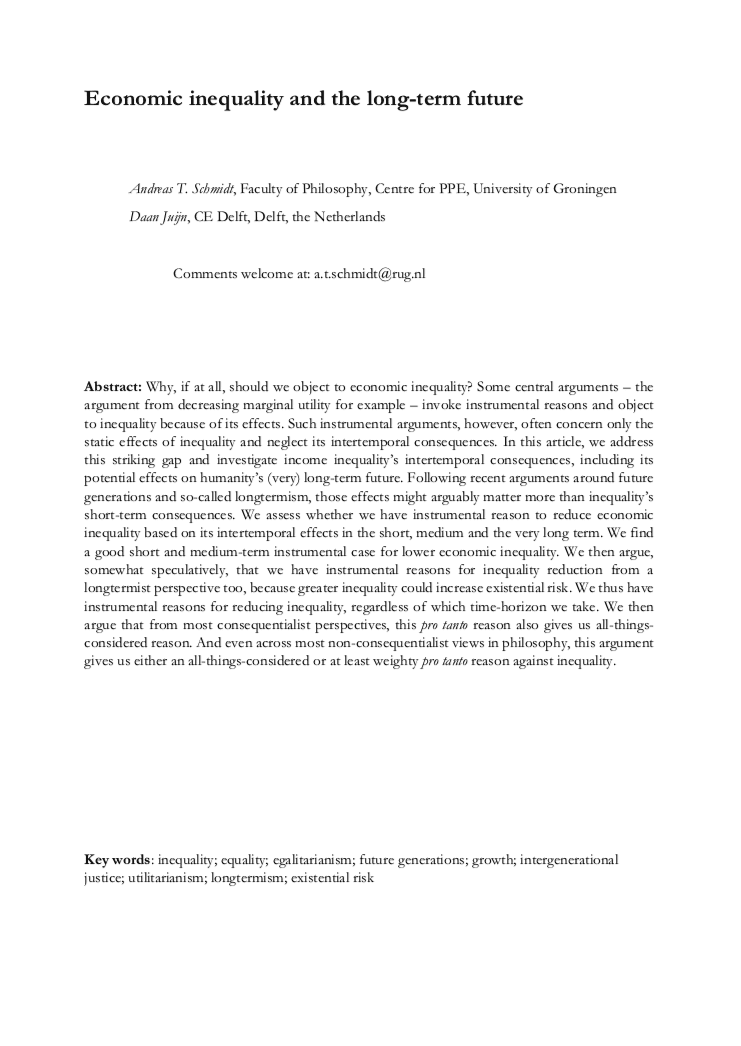Economic inequality and the long-term future
Andreas T. Schmidt (University of Groningen) and Daan Juijn (CE Delft)
GPI Working Paper No. 4-2021, published in Politics, Philosophy & Economics
Why, if at all, should we object to economic inequality? Some central arguments – the argument from decreasing marginal utility for example – invoke instrumental reasons and object to inequality because of its effects. Such instrumental arguments, however, often concern only the static effects of inequality and neglect its intertemporal consequences. In this article, we address this striking gap and investigate income inequality’s intertemporal consequences, including its potential effects on humanity’s (very) long-term future. Following recent arguments around future generations and so-called longtermism, those effects might arguably matter more than inequality’s short-term consequences. We assess whether we have instrumental reason to reduce economic inequality based on its intertemporal effects in the short, medium and the very long term. We find a good short and medium-term instrumental case for lower economic inequality. We then argue, somewhat speculatively, that we have instrumental reasons for inequality reduction from a longtermist perspective too, because greater inequality could increase existential risk. We thus have instrumental reasons for reducing inequality, regardless of which time-horizon we take. We then argue that from most consequentialist perspectives, this pro tanto reason also gives us all-things-considered reason. And even across most non-consequentialist views in philosophy, this argument gives us either an all-things-considered or at least weighty pro tanto reason against inequality.
Other working papers
Concepts of existential catastrophe – Hilary Greaves (University of Oxford)
The notion of existential catastrophe is increasingly appealed to in discussion of risk management around emerging technologies, but it is not completely clear what this notion amounts to. Here, I provide an opinionated survey of the space of plausibly useful definitions of existential catastrophe. Inter alia, I discuss: whether to define existential catastrophe in ex post or ex ante terms, whether an ex ante definition should be in terms of loss of expected value or loss of potential…
AI takeover and human disempowerment – Adam Bales (Global Priorities Institute, University of Oxford)
Some take seriously the possibility of AI takeover, where AI systems seize power in a way that leads to human disempowerment. Assessing the likelihood of takeover requires answering empirical questions about the future of AI technologies and the context in which AI will operate. In many cases, philosophers are poorly placed to answer these questions. However, some prior questions are more amenable to philosophical techniques. What does it mean to speak of AI empowerment and human disempowerment? …
How much should governments pay to prevent catastrophes? Longtermism’s limited role – Carl Shulman (Advisor, Open Philanthropy) and Elliott Thornley (Global Priorities Institute, University of Oxford)
Longtermists have argued that humanity should significantly increase its efforts to prevent catastrophes like nuclear wars, pandemics, and AI disasters. But one prominent longtermist argument overshoots this conclusion: the argument also implies that humanity should reduce the risk of existential catastrophe even at extreme cost to the present generation. This overshoot means that democratic governments cannot use the longtermist argument to guide their catastrophe policy. …

